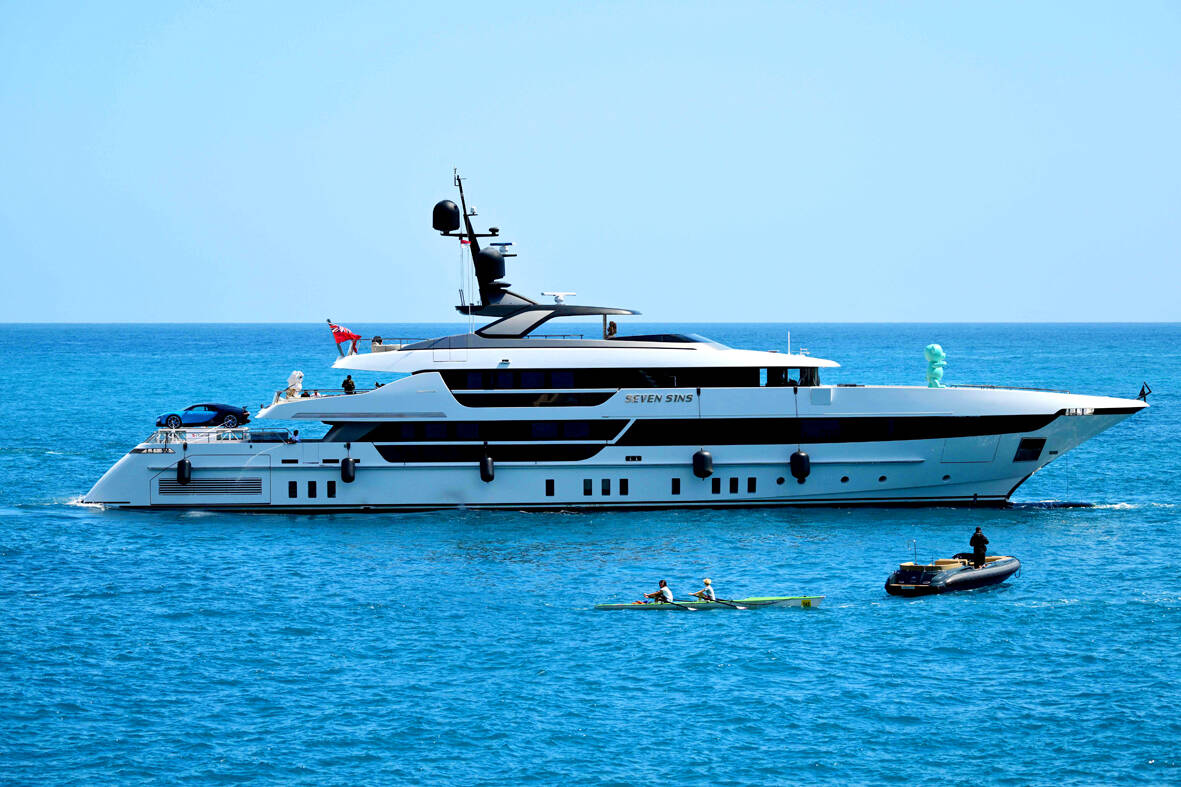An international scheme to tax the wealth of the world’s 3,000 billionaires is technically feasible and could net up to US$250 billion a year in extra revenue, a new report says.
A study by the French economist Gabriel Zucman concluded that progress in finding ways to tax multinational corporations meant it was now possible to levy a global tax on individuals — even if not every country agreed to take part.
Zucman prepared the report after being invited by Brazil — which now holds the presidency of the G20 group of developed and developing nations — to examine ways of increasing the low levels of tax currently paid by the super-rich.

Photo: AFP
“There is overwhelming public support for this idea,” Zucman said at the report’s launch. “Ten years ago nobody believed 130 countries would support a minimum tax on multinationals. It was thought of as utopian.”
The report said billionaires were currently paying an average of 0.3 percent tax on their wealth — less than the rates paid by workers. Zucman said the average wealth of the top 0.0001 percent of individuals had grown by 7.1 percent a year on average between 1987 and this year, increasing the share of global wealth of billionaires from 3 percent to 14 percent.
Describing his plan as a top-up to income tax so that billionaires paid an annual tax bill worth at least 2 percent of their wealth, Zucman said progressive taxation was a “key pillar of modern societies.”
International cooperation was needed to prevent a “race to the bottom,” he said, but it was not necessary for every country to sign up for the idea to get off the ground. The US opposes a global tax on wealth, although Zucman said US President Joe Biden’s budget proposal to tax America’s super-rich was consistent with his plan.
Zucman said valuing the wealth of billionaires would be relatively simple because most of it was held in the form of shares. His report said it could be enforced successfully even if all countries did not adopt it, by strengthening current exit taxes (levies on rich people taking their money to a non-participating jurisdiction) and implementing “tax collector of last resort.”
This would involve extending to individuals rules that allow participating countries to tax non-participating countries’ undertaxed multinationals.
The proposal will be discussed at next month’s G20 meeting of finance ministers in Rio de Janeiro.
Oxfam International’s interim executive director Amitabh Behar said: “This is a sensible and serious proposal that is in every government’s strategic economic interest. All G20 countries should support Brazil’s push to secure the first-ever global deal to tax the super-rich.”
Phil White, member of Patriotic Millionaires UK, said: “Zucman’s report shows that a coordinated, international approach to taxing the super-rich is the sensible and fair way to address the extreme concentration of wealth.
“Addressing billionaire wealth should be viewed as the initial step; if we aim to safeguard democracy from the corrosive effects of extreme wealth, then multimillionaires like me should also be prepared to pay more – and take pride in contributing their fair share.”
Extending the plan to those with wealth in excess of US$100 million would raise an additional US$100 billion TO US$140 billion a year, Zucman said.

Jacques Poissant’s suffering stopped the day he asked his daughter if it would be “cowardly to ask to be helped to die.” The retired Canadian insurance adviser was 93, and “was wasting away” after a long battle with prostate cancer. “He no longer had any zest for life,” Josee Poissant said. Last year her mother made the same choice at 96 when she realized she would not be getting out of hospital. She died surrounded by her children and their partners listening to the music she loved. “She was at peace. She sang until she went to sleep.” Josee Poissant remembers it as a beautiful

March 2 to March 8 Gunfire rang out along the shore of the frontline island of Lieyu (烈嶼) on a foggy afternoon on March 7, 1987. By the time it was over, about 20 unarmed Vietnamese refugees — men, women, elderly and children — were dead. They were hastily buried, followed by decades of silence. Months later, opposition politicians and journalists tried to uncover what had happened, but conflicting accounts only deepened the confusion. One version suggested that government troops had mistakenly killed their own operatives attempting to return home from Vietnam. The military maintained that the

Before the last section of the round-the-island railway was electrified, one old blue train still chugged back and forth between Pingtung County’s Fangliao (枋寮) and Taitung (台東) stations once a day. It was so slow, was so hot (it had no air conditioning) and covered such a short distance, that the low fare still failed to attract many riders. This relic of the past was finally retired when the South Link Line was fully electrified on Dec. 23, 2020. A wave of nostalgia surrounded the termination of the Ordinary Train service, as these train carriages had been in use for decades

Lori Sepich smoked for years and sometimes skipped taking her blood pressure medicine. But she never thought she’d have a heart attack. The possibility “just wasn’t registering with me,” said the 64-year-old from Memphis, Tennessee, who suffered two of them 13 years apart. She’s far from alone. More than 60 million women in the US live with cardiovascular disease, which includes heart disease as well as stroke, heart failure and atrial fibrillation. And despite the myth that heart attacks mostly strike men, women are vulnerable too. Overall in the US, 1 in 5 women dies of cardiovascular disease each year, 37,000 of them